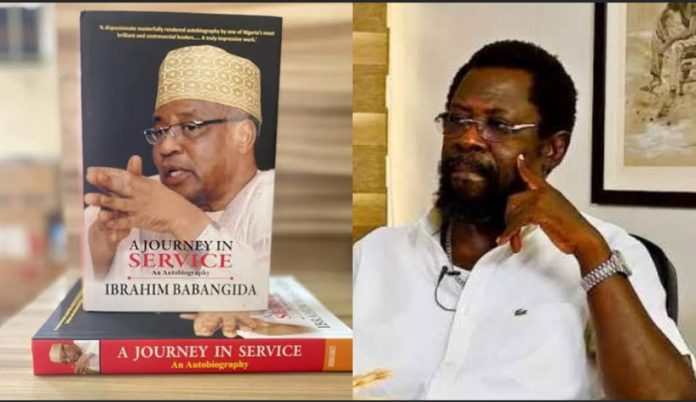Dele Farotimi, a prominent human rights lawyer, has launched a searing critique of former military dictator General Ibrahim Babangida, labeling his reign as ruinous and recounting his active role in the fight against Babangida’s evil actions and inactions.
Dele Farotimi has strongly criticized the legacy of former Nigerian military ruler, General Ibrahim Babangida (IBB), describing his regime as disastrous and filled with corruption. Farotimi, who lived through Babangida’s rule and participated in the resistance against the regime controversial policies, expressed his discontent following Babangida’s recent public admission that Chief M.K.O. Abiola won the 1993 presidential election” a result Babangida’s government annulled.
In a statement posted on X (formerly Twitter), Farotimi responded to Babangida’s memoir, A Journey in Service, released on Thursday, February 20, 2025. While many Nigerians have questioned the former dictator’s actions, particularly his role in annulling the June 12, 1993 election, Farotimi emphasized the mixed bag of lies, half-truths, urban legends, and obfuscations he found in Babangida’s recent public statements.
Farotimi made it clear that his reaction was not one of surprise, but of deep disappointment. “I lived through his ruinous reign, he wrote. I was a passive victim of his evil actions and inactions, I was a participant in the fight to be freed of him. No hagiographic allocutus can redeem the Evil Genius of Minna.
His remarks came in response to a tweet from @realadnantweet, which recommended reading Babangida’s memoir before passing judgment, noting that it offered a “fresh perspective. Farotimi, however, expressed his skepticism, calling out Babangida’s account for attempting to rewrite history and whitewash his damaging actions.
Babangida’s memoir has sparked intense debate across Nigeria, with some critics accusing him of attempting to self-exonerate and distort historical events. Notably, the book revisits the Structural Adjustment Programme (SAP) implemented during his tenure, a policy that led to widespread economic hardship but was justified by Babangida as necessary for economic liberalization.
Farotimi is not alone in his condemnation. Renowned human rights lawyer and former Chairman of the Nigerian Human Rights Commission, Prof. Chidi Odinkalu, also blasted the memoir, calling it a pack of lies and accusing Babangida of maligning deceased individuals who could not defend themselves. Critics argue that the book portrays Babangida as a victim, shifting blame for the country’s turmoil onto figures who are no longer alive to contest his claims.
The central issue surrounding Babangida’s regime, however, remains the 1993 annulment of the presidential election results, which many consider to be one of the darkest chapters in Nigeria’s history. Babangida attempts to justify his actions in the memoir, but for many Nigerians, his decision remains a stain on the country’s democratic progress.
As the country continues to grapple with Babangida’s legacy, Farotimi remarks serve as a reminder of the deep scars left by his authoritarian rule. With ongoing debates about the implications of Babangida’s actions, it remains clear that his tenure will continue to be a point of contention for years to come.

